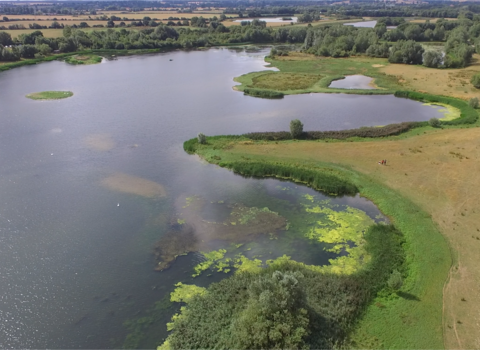Summer Leys nature reserve pulled out all the stops with three rare species making very welcome visits – a Kentish plover, a white stork and a pair common crane, proving a magnet for bird watchers.
Eagle-eyed Matt Hazleton spotted the rare Kentish plover on Tuesday 11 April, but only when looking through his photos did he realise what he'd captured: “When I first saw it I didn't quite believe it was a Kentish plover, it was only when I got back to the car and had a proper look at my photos that the realisation hit me.”
Sharing his sighting and images on Twitter caused a flurry of twitchers and tweeters to flock to the nature reserve for two days running, where the plover continued to wade in the water's margins on Gull Island. Much habitat restoration was carried out by the Trust in the autumn and the work has clearly paid dividends – numerous waders and water fowl from snipe to redshank to lapwing breed here.
A former breeder in southern England, hence the name, the Kentish Plover is now a scarce but annual visitor from Europe, this was only the 12th record for Kentish plover in Northamptonshire – and also the first in the county for almost 30 years. In the last century it was simply a scarce annual UK visitor but in recent years it has assumed almost vagrant status nationally and, as such, pulled in birders from far and wide; there were only six records in the UK in 2021.
Not to be outdone by a tiny wader, next day two much larger species turned up – a white stork (unringed) was spotted in the skies above – which then also landed and hung around the area for a few days. While reintroduced birds are clearly ringed, wild birds may or may not be and it is said that two collections in Cambridgeshire have a total of at least five unringed and free-flying birds.
Following that was a fly past by a pair of common cranes, who also took a liking to the reserve and landed to check it out - approximately 33 sightings in the county to date. This magnificent nature reserve provides one of the best wetland habitats around; the regular visitors appreciate all the work by the Trust to maintain superb habitat conditions, ensuring it as an internationally important haven for breeding and wading birds.





